DevOps continues to be a critical methodology for software development, helping organizations streamline their workflows, enhance collaboration, and deliver high-quality software faster.
What is DevOps?
It is a combination of cultural philosophies, practices, and tools that increase an organization’s ability to deliver applications and services at high velocity. By integrating development (Dev) and operations (Ops), it enables organizations to evolve and improve products at a faster pace than traditional software development and infrastructure management processes.
Recent research shows that it is now widely embraced across the industry. Nearly three-quarters (72.7%) of organizations use DevOps for more than half of their projects, with 18.7% adopting it for all their projects and 32.8% using DevOps for three-fourths of their initiatives. This widespread adoption reflects its vital role in modern software workflows.
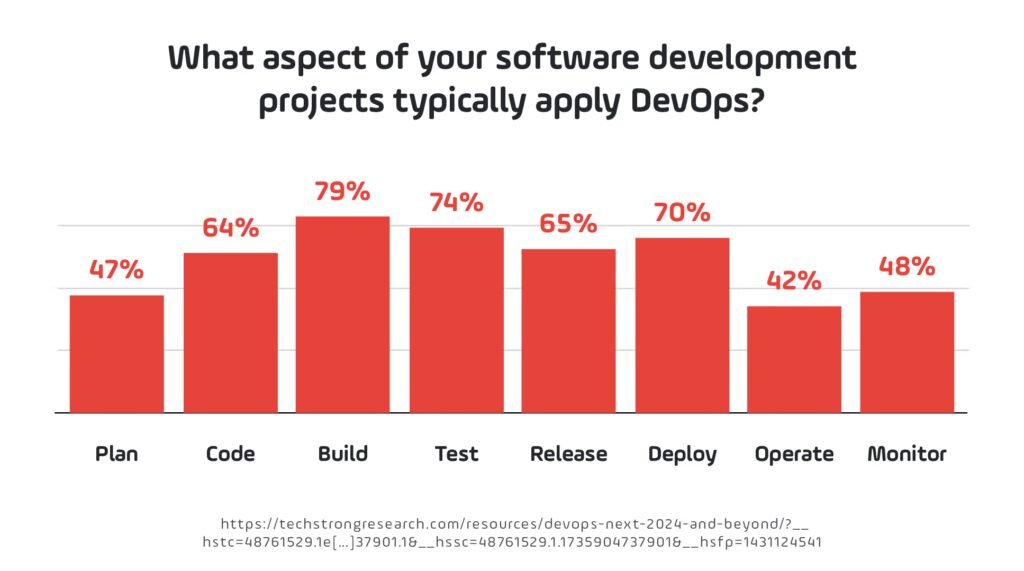
The DevOps Lifecycle
This lifecycle encompasses a series of stages that facilitate continuous integration, delivery, and improvement. These stages include:
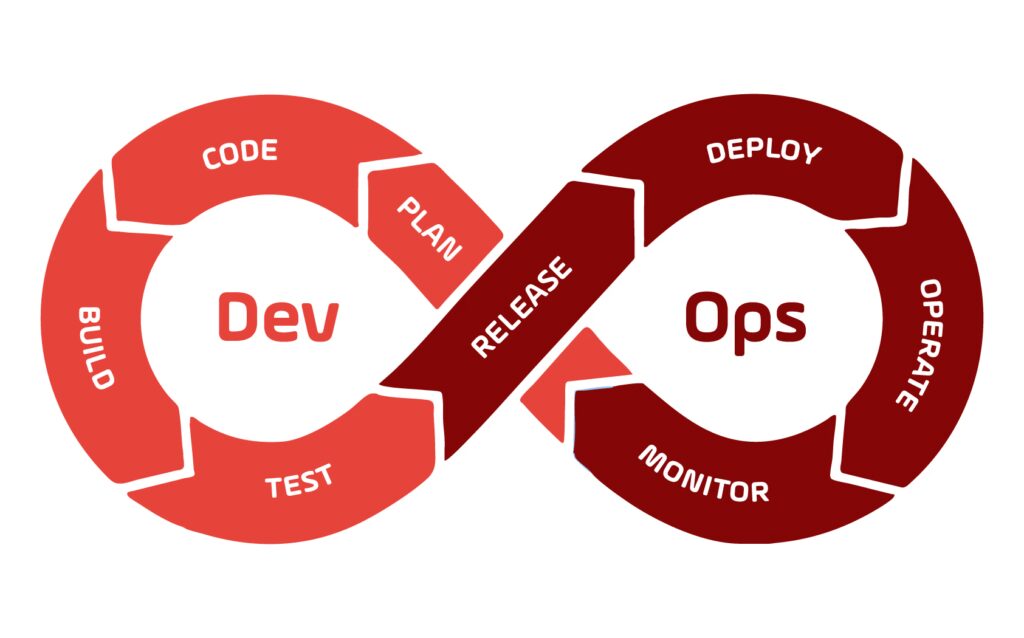
Plan: Teams define objectives, gather requirements, and create project roadmaps.
Develop: Source code is written, reviewed, and managed using tools like Git.
Build: Code is compiled into executable formats with automated build tools like Jenkins.
- Test: Continuous testing ensures functionality and identifies bugs before release.
- Release: Applications are deployed in a controlled and consistent manner.
- Operate: Systems are monitored and maintained to ensure reliability and performance.
- Monitor: Metrics and logs are analyzed to improve performance and detect issues proactively.
This lifecycle promotes collaboration and ensures high-quality software development delivery.
The Evolution of DevOps in the Past Five Years
From 2020 to 2025, several key trends have defined this evolution:
- Increased Automation: Automation has gone from being a nice-to-have feature to an essential component. Tools like Jenkins, GitLab, and Azure DevOps have become more sophisticated, enabling near-total automation of CI/CD pipelines.
- The Rise of AI in DevOps: Artificial intelligence and machine learning technologies have become integral to predictive analytics, automated testing, and anomaly detection in DevOps workflows. AI-powered tools like Dynatrace and TabNine now identify issues proactively and suggest solutions before they impact production.
- Cloud-Native DevOps: With the proliferation of cloud platforms, DevOps has increasingly focused on cloud-native applications. Kubernetes and Docker have become the standard for containerization and orchestration, ensuring scalability and portability.
- Security Shift-Left: The “shift-left” approach to security—integrating security considerations earlier in the development lifecycle—has gained momentum. DevSecOps ensures that vulnerabilities are detected and resolved during development rather than after deployment.
- Focus on Observability: As systems grow more complex, observability has become a cornerstone of DevOps. Teams now prioritize distributed tracing, log aggregation, and metrics to gain insights into system health and performance. Tools like ELK Stack and OpenTelemetry (https://opentelemetry.io/) are widely used.
This guide explores how these developments influence the best practices for DevOps in 2025, along with actionable steps to implement them effectively.
DevOps Best Practices: Mastering Efficiency and Collaboration in 2025
1. Embracing AI and Machine Learning in DevOps
AI and machine learning (ML) are becoming integral to DevOps processes, bringing unprecedented opportunities for automation, efficiency, and innovation. These technologies can analyze vast amounts of data to optimize CI/CD pipelines, predict system failures, and improve decision-making processes. Their ability to automate repetitive tasks and provide actionable insights makes them indispensable for modern workflows.
According to the DevSecOps Report, 78% of respondents said they are currently using AI in software development or plan to within the next two years, up from 64% in 2023. This growing adoption highlights the critical role AI and ML play in enabling faster, smarter, and more reliable development practices.
- Adoption Trends: Organizations are increasingly adopting AI in their development processes. According to the DevOps Next: 2024 and Beyond Study:
- 32.7% of organizations currently use AI in development.
- 41.5% are considering using AI in development.
- Only 16.2% are not using AI today, and just 5.7% have no plans to adopt it.
- Effectiveness of AI in DevOps: Among mature teams, those using AI are significantly (30%) more likely to rate their team as highly effective compared to those who do not use AI, according to the same study conducted by Techstrong Research.
- Future Potential: While AI has already made significant strides in software development and DevOps, it is still in its early stages. The coming years promise continuous innovation as technology vendors explore new applications for AI in development, testing, and operational processes.
- Advantages of Usage:
- Reduces manual effort in code reviews by up to 50%.
- Enhances decision-making with predictive analytics for system failures.
- Accelerates testing cycles by automating repetitive tasks.
- Potential Challenges:
- Requires quality datasets for effective predictions.
- Integration can be costly for small teams.
- Best Practices:
- Case Study: A global e-commerce company implemented AI-driven load testing to simulate high traffic during peak sales events. By predicting infrastructure bottlenecks, they reduced downtime by 80% during Black Friday sales, increasing revenue by $2 million. Research on AI in DevOps here.
2. Continuous Integration and Continuous Delivery (CI/CD) at Scale
CI/CD remains the backbone of DevOps, enabling teams to deliver high-quality software quickly and reliably. The core philosophy of CI/CD revolves around automating the build, test, and deployment stages, ensuring that new code can be integrated and released with minimal friction. In 2025, scaling CI/CD pipelines for large teams and distributed systems is more critical than ever, as organizations strive to meet the demands of rapidly evolving markets.
According to a recent survey, 29.6% of collaborators reported using four or more CI/CD solutions in their organizations. This underscores the increasing complexity of modern development environments and the importance of well-integrated CI/CD practices to streamline workflows and minimize bottlenecks.
- Advantages of Usage:
- Shortens time-to-market for new features and bug fixes.
- Minimizes deployment errors through automation.
- Enables frequent updates, ensuring software meets user needs.
- Potential Challenges:
- Initial setup can be complex, requiring expertise in pipeline tools.
- Scaling across large teams may require significant coordination.
- Best Practices:
- Adopt tools like Jenkins, GitHub Actions, or GitLab CI/CD for seamless automation.
- Use feature flags to enable canary deployments and reduce risks during releases.
- Standardize pipeline configurations across teams for consistency.
- Case Study: A fintech startup scaled its CI/CD pipelines to handle 100+ microservices, reducing deployment times by 40% and improving overall system reliability. Industry insights on CI/CD adoption can be found here.
3. Infrastructure as Code (IaC) for Better Scalability
Infrastructure as Code (IaC) is revolutionizing how organizations manage infrastructure. By automating the provisioning and management of resources, IaC reduces manual effort and ensures consistency across environments. Puppet’s 2023 State of DevOps Report found that 85% of organizations leveraging IaC report faster deployment times and improved scalability.
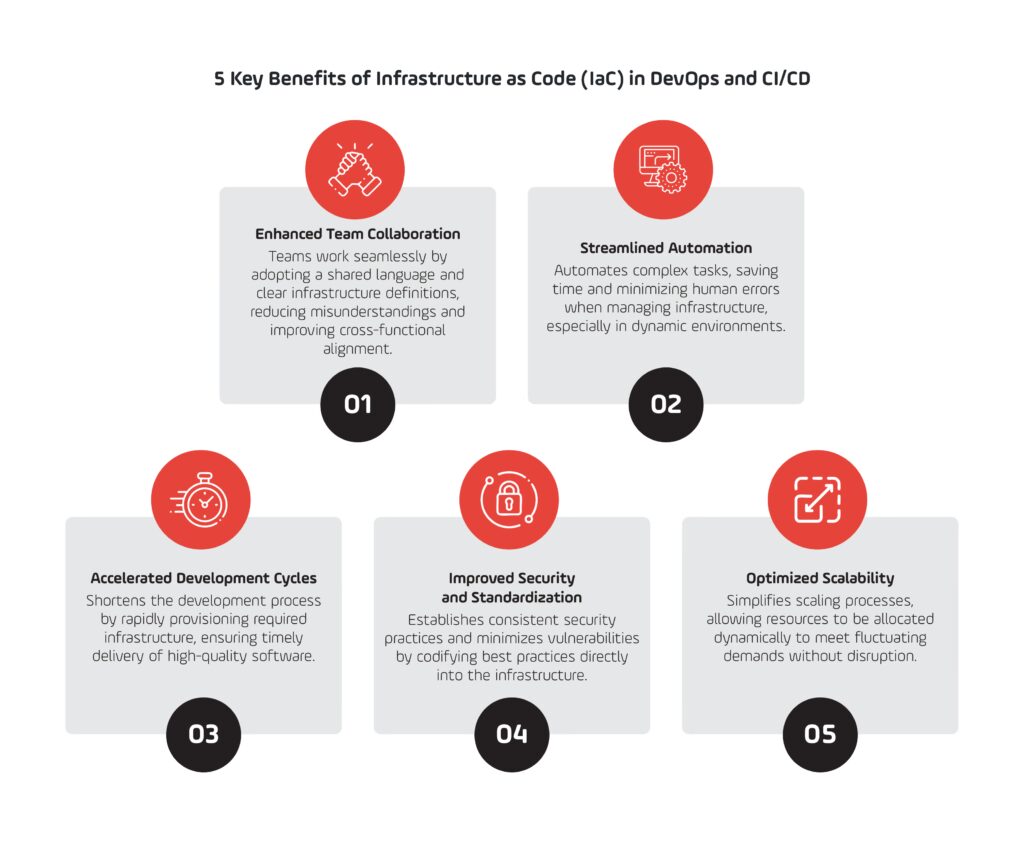
Furthermore, teams adopting IaC experience a 40% reduction in configuration errors, enabling them to scale infrastructure seamlessly and adapt to changing demands in real time. Tools like Terraform and AWS CloudFormation remain foundational to modern IaC practices.
- Advantages of Usage:
- Improves consistency across environments, reducing deployment issues.
- Speeds up disaster recovery by enabling automated infrastructure restoration.
- Simplifies version control for infrastructure configurations.
- Potential Challenges:
- Debugging IaC scripts can be complex in large-scale deployments.
- Requires skilled personnel to write and maintain configurations.
- Best Practices:
- Use tools like Terraform or AWS CloudFormation for infrastructure automation.
- Implement GitOps (https://www.gitops.tech/) to version-control IaC and enable automated rollbacks.
- Regularly test IaC scripts in staging environments before deploying to production.
- Case Study: A healthcare provider used Terraform to automate the provisioning of HIPAA-compliant environments, reducing setup times from six weeks to two days. Click here for a discussion on the detailed benefits of IaC.
4. Enhancing Security with DevSecOps
As cyber threats become more sophisticated, integrating security into the DevOps lifecycle—known as DevSecOps—has become a top priority. DevSecOps ensures that security is embedded into every stage of the software development lifecycle, rather than being an afterthought. According to industry data, security breaches have increased by 35% over the past five years, making robust security practices more critical than ever.
By embedding automated security testing and vulnerability scans into CI/CD pipelines, organizations can significantly reduce risks and improve compliance with regulatory requirements. Gartner predicts that by 2026, 75% of organizations implementing DevSecOps practices will reduce vulnerabilities by at least 50%. Automated tools like Snyk and SonarQube allow teams to proactively identify risks while accelerating secure software delivery.
- Advantages of Usage:
- Mitigates risks by identifying vulnerabilities early in the development lifecycle.
- Enhances compliance with regulatory requirements.
- Improves team collaboration by embedding security into processes.
- Potential Challenges:
- Requires continuous training for developers to maintain security best practices.
- Initial setup of automated security tools may require substantial effort.
Security is a non-negotiable aspect of modern DevOps. DevSecOps integrates security into every stage of the development lifecycle, ensuring robust protection against vulnerabilities.
- Best Practices:
- Case Study: A SaaS company integrated automated security testing into its CI/CD pipeline, identifying and resolving 95% of vulnerabilities before deployment. Studies on DevSecOps effectiveness are available here.
5. Observability and Monitoring for Proactive Incident Management
As systems grow more complex, observability and monitoring have become indispensable. Observability goes beyond traditional monitoring by providing deep insights into system behavior, helping teams identify root causes of incidents and optimize performance.
Observability is a cornerstone for achieving operational excellence in 2025. Tools like Prometheus and OpenTelemetry are leading solutions in this space.
- Advantages of Usage:
- Reduces mean time to resolution (MTTR) for incidents by providing real-time insights.
- Enhances customer satisfaction by ensuring high system availability.
- Facilitates capacity planning through historical data analysis.
- Potential Challenges:
- Collecting and storing large volumes of data can be costly.
- Requires expertise to interpret complex metrics and logs effectively.
Observability is essential for understanding system behavior and ensuring high availability. Advanced monitoring tools provide real-time insights to prevent and resolve incidents.
- Best Practices:
- Implement distributed tracing with tools like OpenTelemetry to identify performance bottlenecks.
- Use centralized logging solutions like ELK Stack or Splunk.
- Set up proactive alerting systems to detect anomalies before they escalate.
- Case Study: An online streaming service used observability tools to monitor server latency, reducing buffer times by 30% and improving user satisfaction. For data-driven monitoring strategies, see here.
6. Leveraging Containerization and Kubernetes
Containerization has transformed how applications are developed and deployed by enabling portability and scalability. Kubernetes, the most widely adopted container orchestration tool, allows organizations to manage thousands of containers with ease, automating tasks like scaling and load balancing.
The CNCF 2024 Annual Survey reported that 96% of organizations are using or evaluating Kubernetes, with 76% citing improved resource utilization as a key benefit. These figures underscore the critical role Kubernetes plays in modern cloud-native architectures.
- Advantages of Usage:
- Simplifies application scaling to handle traffic spikes efficiently.
- Improves resource utilization by isolating workloads in containers.
- Enables faster deployment cycles with minimal system dependencies.
- Potential Challenges:
- Learning curve for Kubernetes can be steep for new users.
- Requires robust monitoring to manage container sprawl.
Containerization and orchestration tools like Kubernetes are pivotal for managing modern applications at scale. They offer flexibility, scalability, and efficient resource utilization.
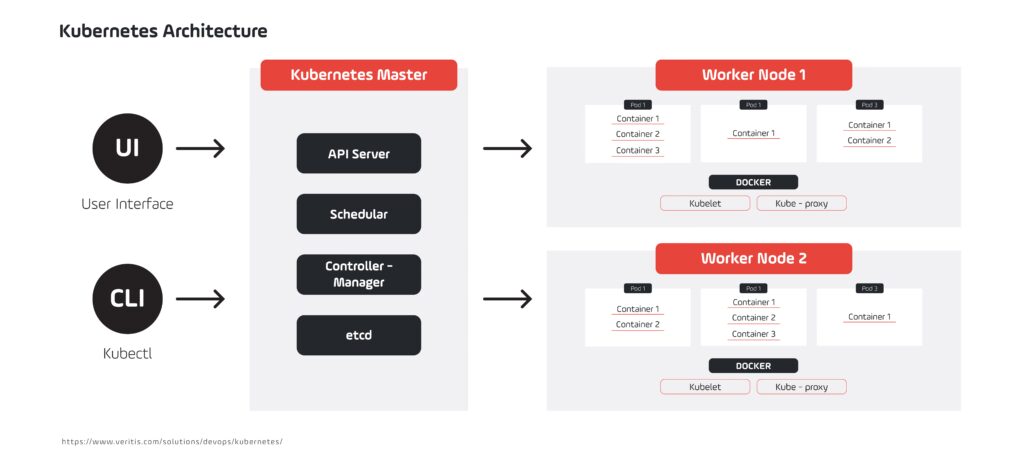
- Best Practices:
- Use Helm charts for managing Kubernetes deployments.
- Monitor container health with tools like Prometheus or Datadog.
- Regularly update container images to avoid security vulnerabilities.
- Case Study: A gaming company migrated its infrastructure to Kubernetes, achieving 99.99% uptime and significantly improving player experience during peak traffic. Kubernetes adoption statistics are available here.
7. Culture of Collaboration and Continuous Improvement
DevOps thrives on a culture of collaboration, where development and operations teams work together seamlessly toward shared goals. This culture fosters innovation and ensures that teams can adapt to the ever-changing technological landscape.
A study by Atlassian revealed that organizations fostering DevOps collaboration are 45% more likely to release features on time and 30% more likely to meet customer satisfaction targets. Practices like cross-functional retrospectives and shared accountability are essential for long-term success in software development.
- Advantages of Usage:
- Encourages innovation through open communication and shared goals.
- Reduces silos between development and operations teams.
- Increases team morale and productivity through continuous learning initiatives.
- Potential Challenges:
- Fostering collaboration may require cultural shifts within the organization.
- Continuous improvement requires regular investment in training and feedback mechanisms.
DevOps is not just about tools; it’s about fostering a collaborative culture. Teams need to prioritize communication, shared goals, and continuous learning.
- Best Practices:
- Hold regular retrospectives to identify areas for improvement.
- Encourage cross-functional teams to work on shared objectives.
- Invest in DevOps training and certifications for team members.
- Case Study: A multinational bank adopted DevOps training programs for its development and operations teams, resulting in a 50% reduction in deployment errors. Learn about building DevOps cultures here.
8. Cost Optimization in Workflows
As cloud computing costs rise, optimizing resources has become a key priority for DevOps teams. Cost optimization involves analyzing resource usage, automating scaling, and aligning workloads with business priorities to reduce waste and improve ROI.
A Flexera report found that 59% of organizations overspend on cloud resources, with 43% identifying cost optimization as their top priority. By leveraging tools like AWS Cost Explorer and Azure Cost Management, teams can implement strategies to save up to 30% annually.
- Advantages of Usage:
- Reduces cloud expenses by optimizing resource allocation.
- Improves ROI by aligning workloads with business priorities.
- Prevents over-provisioning through automated scaling policies.
- Potential Challenges:
- Requires accurate monitoring to identify cost-saving opportunities.
- Misconfigured automation can lead to unexpected expenses.
Managing costs effectively is a key priority for DevOps teams. Optimized workflows help organizations achieve more with fewer resources.
- Best Practices:
- Use cloud cost management tools like AWS Cost Explorer or Azure Cost Management.
- Schedule non-essential workloads to run during off-peak hours.
- Continuously analyze and optimize resource utilization.
- Case Study: An IoT company reduced its cloud expenses by 30% by leveraging auto-scaling policies and analyzing usage patterns with AWS Cost Explorer.
Best Courses for Learning DevOps in 2025
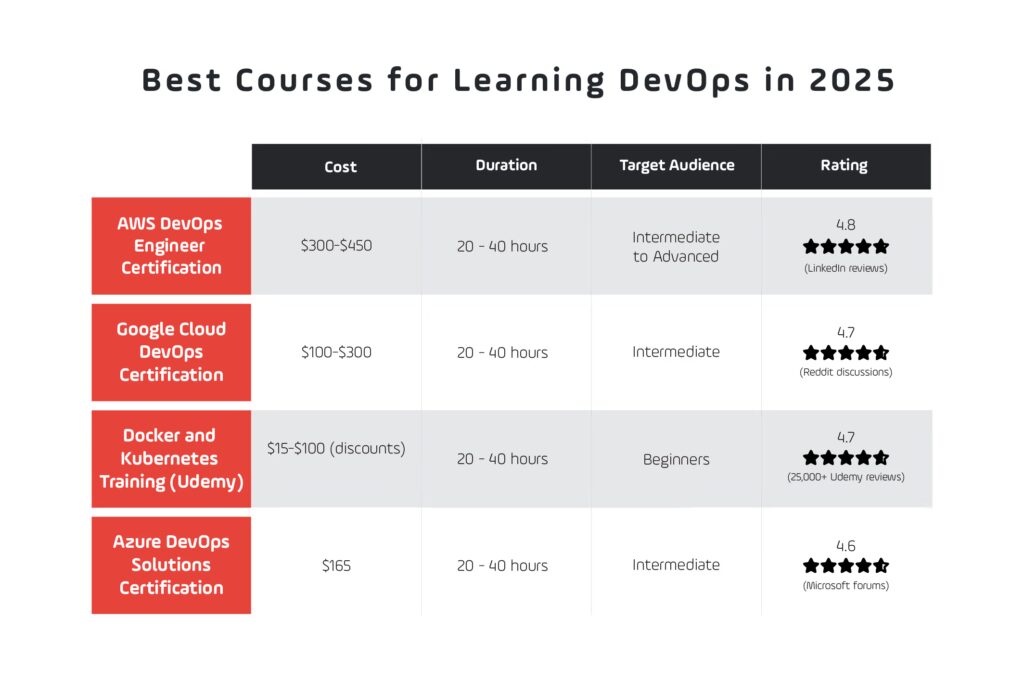
1. AWS DevOps Engineer Certification
- Cost: $300-$450 for the exam.
- Duration: 20-40 hours of preparation.
- Target Audience: Best suited for IT professionals with experience in AWS services and cloud technologies.
- Ratings: Highly rated by professionals on LinkedIn for its relevance in enterprise DevOps roles.
- Website: https://aws.amazon.com/certification/certified-devops-engineer-professional/
2. Google Cloud DevOps Certification
- Cost: $100-$300, depending on the training platform.
- Duration: 25-35 hours.
- Target Audience: Ideal for those focused on CI/CD pipelines and Site Reliability Engineering (SRE) in Google Cloud environments.
- Ratings: Praised on Reddit for its hands-on approach to SRE principles.
- Website: https://cloud.google.com/learn/certification/cloud-devops-engineer
3. Docker and Kubernetes Training by Udemy
- Cost: $15-$100 (varies based on discounts).
- Duration: 6-15 hours.
- Target Audience: Suitable for beginners exploring containerization and Kubernetes.
- Ratings: 4.7/5 on Udemy with 25,000+ reviews.
- Website: https://www.udemy.com/
4. Azure DevOps Solutions Certification
- Cost: $165 for the exam.
- Duration: 20-30 hours of preparation.
- Target Audience: Best for those interested in CI/CD pipelines, GitOps, and Azure DevOps tools.
- Ratings: Endorsed by Microsoft professionals for enterprise-level DevOps.
- Website: https://learn.microsoft.com/en-us/certifications/devops-engineer
DevOps Events to Watch in 2025
- AWS re:Invent
- Focus: Cloud computing, DevOps practices, and AWS tools.
- Target Audience: Cloud architects, DevOps engineers, and developers.
- Format: Hybrid (in-person in Las Vegas + virtual sessions).
- Registration Costs: Starts at $1,799 for in-person; virtual sessions are free.
- Dates: December 1-5, 2025.
- Website: https://reinvent.awsevents.com
- KubeCon + CloudNativeCon Europe
- Focus: Kubernetes and cloud-native technologies.
- Target Audience: Cloud-native professionals, developers, and DevOps engineers.
- Format: In-person in London.
- Registration Costs: $800–$1,500, depending on the ticket type.
- Dates: April 1–4, 2025.
- Website: https://events.linuxfoundation.org/kubecon-cloudnativecon-europe/
- The DevOps Conference: London
- Focus: DevOps best practices, continuous delivery, and cultural transformation in IT.
- Target Audience: Developers, DevOps engineers, and IT leaders.
- Format: In-person in London.
- Registration Costs: Approximately $300–$500.
- Dates: March 14, 2025.
- Website: https://www.thefutureofsoftware.com
- SREday
- Focus: Site Reliability Engineering (SRE), automation, and system resilience.
- Target Audience: SREs, DevOps engineers, and infrastructure professionals.
- Format: In-person in London.
- Registration Costs: $250–$500.
- Dates: March 27–28, 2025.
- Website: https://www.sreday.com/
- LeadDev London
- Focus: Leadership, team building, and scaling DevOps practices.
- Target Audience: Engineering managers, technical leads, and DevOps practitioners.
- Format: In-person.
- Registration Costs: $400–$700.
- Dates: June 16–17, 2025.
- Website: https://leaddev.com/leaddev-london/
- Digital Transformation Week 2025
- Focus: The role of DevOps in driving digital transformation.
- Target Audience: Business leaders, DevOps professionals, and IT architects.
- Format: In-person in London.
- Registration Costs: Free with registration.
- Dates: February 5–6, 2025.
- Website: https://www.digitaltransformation-week.com/
- PlatformCon
- Focus: Internal developer platforms, productivity tools, and DevOps automation.
- Target Audience: Platform engineers, SREs, and DevOps teams.
- Format: Virtual.
- Registration Costs: Free.
- Dates: June 23-27, 2025
- Website: https://platformcon.com/
- DTX London
- Focus: Digital transformation and the role of DevOps in modern IT strategies.
- Target Audience: CIOs, IT leaders, and DevOps professionals.
- Format: In-person.
- Registration Costs: $500–$800.
- Dates: December 12-13, 2025
- Website: https://www.dtxeurope-london.com
- DevOps Days Conferences
- Focus: Covers a variety of DevOps topics, including CI/CD, infrastructure as code, and collaboration practices.
- Target Audience: Suitable for all levels, from beginners to seasoned DevOps professionals.
- Format: In-person and virtual options depending on location.
- Registration Costs: Typically $50–$200, depending on the city.
- Dates: Various throughout 2025 (check specific city events).
- Website: https://devopsdays.org
What Does the Future Hold for DevOps?
The DevOps market is witnessing an unprecedented surge, underscoring its vital role in modern software development. Growing from USD 10.32 billion in 2023 to USD 11.62 billion in 2024, DevOps continues to drive collaboration, automation, and innovation across industries. By 2030, it is expected to reach USD 24.24 billion, with a Compound Annual Growth Rate (CAGR) of 12.97%, according to the Research and Markets Global Forecast 2025-2030. This remarkable growth reflects the increasing demand for faster delivery cycles, seamless operations, and reliable software development practices.
A Dynamic Evolution in IT
DevOps has evolved from being a niche philosophy to becoming a mainstream methodology that integrates cutting-edge IT technologies such as AI, machine learning, and automation. The adoption of practices like Continuous Integration/Continuous Delivery (CI/CD), Infrastructure as Code (IaC), and DevSecOps has enabled organizations to achieve unparalleled efficiency and scalability in their IT workflows. As we look ahead, this trend is poised to accelerate, with innovations in observability, Kubernetes, and platform engineering driving further IT advancements.
Building IT-focused DevOps expertise is crucial for navigating this landscape. Resources like the DevOps Bootcamp: Must-Have Skills for IT Talent provide essential insights into equipping teams with the knowledge and tools they need.
Challenges on the Horizon for IT
Despite its growth, the future of DevOps in IT isn’t without challenges. Skills shortages, rising cloud costs, and increasing complexity in distributed systems are barriers IT organizations must overcome. However, by investing in training, certifications, and collaborative IT cultures, these hurdles can become opportunities for growth and learning.
Seizing IT Opportunities
From leveraging AI-powered tools to attending industry-leading events like AWS re:Invent and KubeCon, the opportunities for IT growth are endless. By understanding the history of DevOps, adopting its best practices, and investing in professional development, IT teams can stay ahead in an ever-evolving technological landscape.
In conclusion, it isn’t just a trend—it’s a cornerstone of modern IT and software development. As IT businesses continue to innovate and adopt DevOps methodologies, the potential for growth, efficiency, and innovation remains boundless. By staying informed and adaptable, you can harness the power of DevOps to drive IT success in 2025 and beyond. For tailored guidance on implementing strategies or optimizing your IT workflows, feel free to contact us to discuss how we can help your organization thrive.